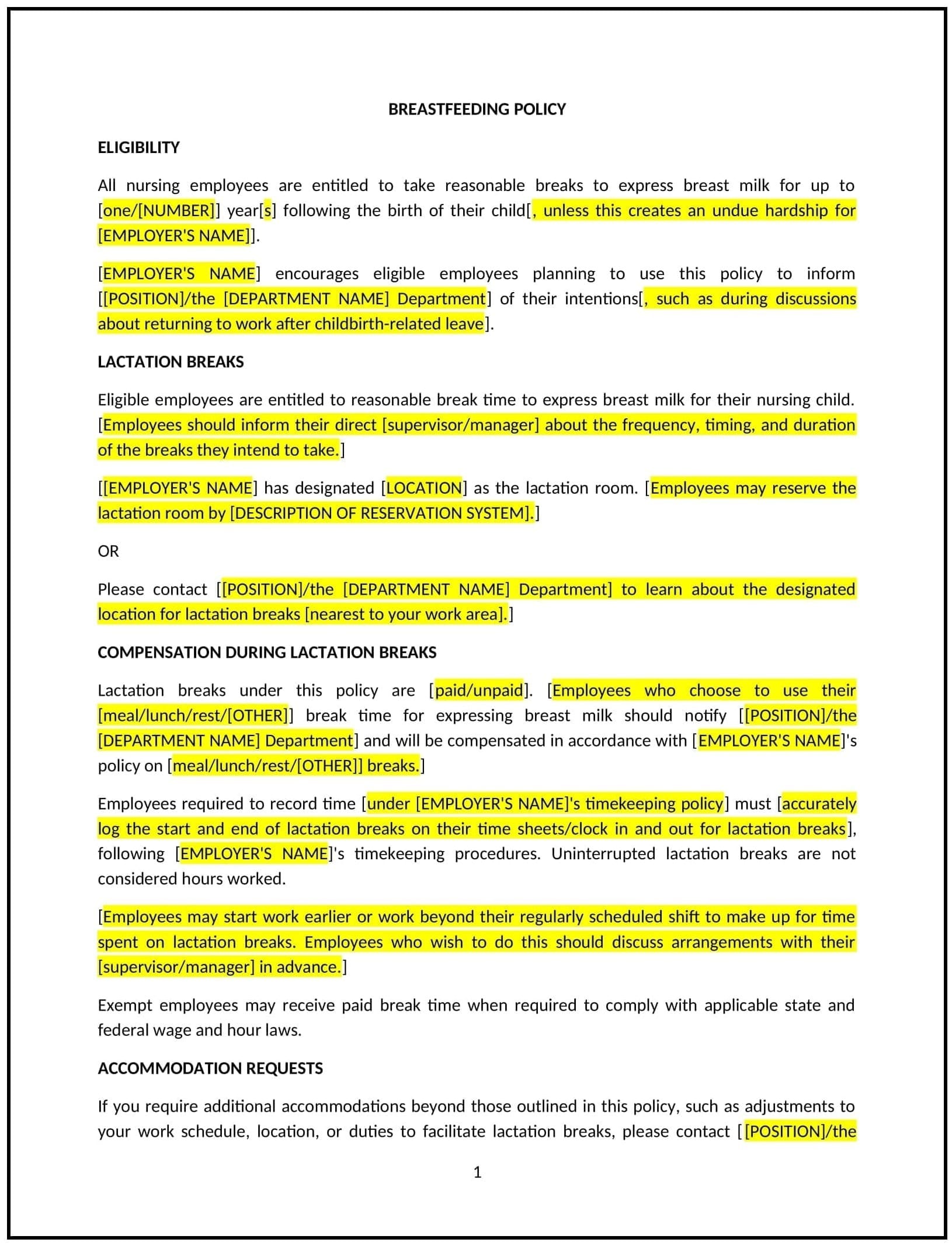Breastfeeding break policy (Michigan): Free template
Got contracts to review? While you're here for policies, let Cobrief make contract review effortless—start your free review now.

Customize this template for free
Breastfeeding break policy (Michigan)
A breastfeeding break policy provides Michigan businesses with guidelines to support breastfeeding employees by offering appropriate breaks and accommodations to express milk during the workday. This policy aims to ensure employees can balance work and breastfeeding needs while maintaining a healthy, productive work environment.
By adopting this policy, businesses can comply with Michigan laws, support employee well-being, and foster a family-friendly workplace culture.
How to use this breastfeeding break policy (Michigan)
- Define the accommodation: Specify the type of accommodation provided, such as private spaces for breastfeeding or expressing milk, and access to clean water and refrigeration for storing milk.
- Set break times: Outline the amount of break time allocated for breastfeeding or milk expression, which may vary depending on the length of the employee's shift.
- Clarify frequency of breaks: Specify how many breaks are allowed per day, such as two 15-minute breaks, and if employees are entitled to more time for longer shifts.
- Address the private space requirements: Ensure that the designated space is private, sanitary, and free from distractions, where employees can comfortably express milk.
- Include flexibility: Offer flexibility in break times or accommodations as needed, considering the employee's individual needs and shift schedule.
- Ensure non-retaliation: Make it clear that employees are not subject to retaliation for using their breaks or accommodations to breastfeed or express milk.
- Specify how employees should request breaks: Provide guidelines on how employees can request breastfeeding breaks or accommodations, including any notice period or communication with management.
Benefits of using this breastfeeding break policy (Michigan)
This policy provides several key benefits for Michigan businesses:
- Promotes employee health and well-being: Supports breastfeeding employees by accommodating their needs, helping them maintain their health and the health of their children.
- Enhances retention: A supportive work environment for breastfeeding employees can help retain top talent, especially among working mothers.
- Increases productivity: By providing employees with the support they need, businesses can improve employee satisfaction and focus, which leads to greater overall productivity.
- Complies with legal requirements: The policy ensures compliance with Michigan state laws and federal regulations, such as the Fair Labor Standards Act (FLSA) and the Affordable Care Act (ACA), regarding breastfeeding accommodations.
- Fosters a family-friendly work culture: Demonstrates the business’s commitment to supporting employees’ work-life balance, promoting a more inclusive and respectful workplace.
Tips for using this breastfeeding break policy (Michigan)
- Communicate the policy: Ensure all employees are aware of the policy and understand their rights to breastfeeding breaks and accommodations through onboarding, handbooks, and employee communications.
- Provide training: Train managers and supervisors on the policy to ensure they understand how to handle requests for breastfeeding breaks and accommodate employees appropriately.
- Monitor compliance: Ensure the policy is being followed by conducting regular checks and encouraging employees to provide feedback if they experience difficulties accessing breastfeeding accommodations.
- Offer flexibility: Recognize that employees may have different needs and provide flexibility in the scheduling of breastfeeding breaks or accommodations.
- Review periodically: Update the policy as needed to comply with changes in Michigan laws, federal regulations, or evolving workplace needs.